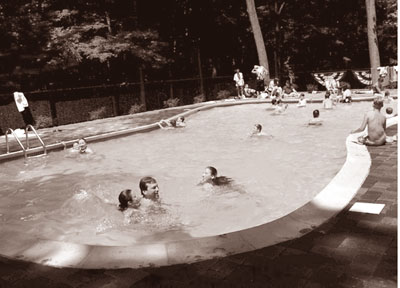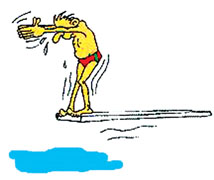|
observer |
|
|
|
|
|
OTHER LINKS |

|

|

|
'fraid to swim!It is one of the first things we learn as children: this country that we live in is completely surrounded by water - an island. Then as we get to perhaps the third grade, we learn the little rhyme about the ala, dola, ganga and how they flow or not, all about our country - this island. So, basically speaking, we've got bodies of water just about everywhere in Sri Lanka, we've got an ocean around the entire landmass that we reside on, yet, just about how many of us know even the basics of swimming?
Swimming instructor, Mr. Fernando concurs: "When I go on holiday I see people standing in the pool, pretending to swim. Even when I teach adults, they come to the class claiming to know the swimming basics, but only know to float while holding on to the edge. People think that just because they don't go under in a pool that's 5'5'' deep, they are naturally able to swim." "The worst thing for a lifeguard is when these people with no training, try swimming in the sea," adds *Sampath. While it is not as dangerous in the shallows, people misjudge depths or go too far and struggle to stay afloat. Sometimes you see the very same person you had to calmly swim back to the shore, going back for another dip next week." Is it this self-delusional idea, that we Sri Lankans are born with the ability to swim, that stops us from learning to swim for real? Or is it the arrogant feeling that no harm shall fall upon us? Mrs. Balasuriya thinks the latter. "I think we as a whole are quite conceited in certain ways, and have this idea that since we're crowded with various bodies of water just inside the island itself, we can't quite possibly find danger in them. Hence, there's no reason to actually learn to swim," believes this swimmer.
I think the problem is basically confined to the people in the city, who either have to go for swimming classes or do without." He admits however, that he simply has no time to attend swimming classes, and hence never sees himself as being trained in the skills of swimming. "I'll take the risk." It is plausible to speculate that it was this attitude that led to the accidental deaths of 1,087 people in 2004, caused by drowning. It is also probable that the knowledge of not being a swimmer led 5% of successful suicides to use drowning as the method of doing themselves in, in 2001. It is also probable that the reason only the 5% chose drowning was because it is no fun experience according to *Nishantha. "I love the sea baths and make it a point to go to the south for my holidays. I used to consider myself pretty good, in that, I've never obtained formal swimming training, and yet am able to swim in the sea. Around two years ago, I and my pals were taking a swim in the Beruwela beach when I managed to wander too far and felt a slight cramp in my left leg. I tried to scream but no one heard me, and I started to go down. I remember trying to hold my breath and that's it. (At first, reflex breath holding occurs but is eventually overcome whence water is taken into the lungs, the larynx spasms leading to further asphyxiation and an uncharacteristic heart beat. The water absorbed from the lungs alters the mineral concentration of the blood leading to red blood cells being damaged; blood plasma turns excessively acidic - could cause a coma; lungs swell due to the accumulation of excess watery fluid around cells; and the stomach dilates.) Luckily for me, a foreign guy had seen me from the shore and rescued me. He resuscitated me and I was taken to the hospital. I hadn't been under water for too long, so I was only shaken. The first thing I did when I got home was to enrol in a swimming class. I still take a swim," he laughs, "but don't try any stupid stuff and always stay close to the shore." The fact remains however, that most of us are not trained swimmers. I, myself cannot swim though it does not keep me from wading in to the Mahaweli during family visits, nor taking a bath at the base of Dunhinda or washing my legs at the beach in Yala. I might be willing to take the risk, so might your friends and colleagues, but should you? * names have been changed |
 "There are a lot of people who think they can swim just because they
get into a pool not as deep, as they are tall and would not drown. I've
seen people play games in the water not by swimming but running around.
I've seen them all lounging, moving their arms in strokes, kicking in
their legs, taking it to be swimming just because of the feeling of
floating they get from being in the water," says volunteer lifeguard, *Sampath.
"There are a lot of people who think they can swim just because they
get into a pool not as deep, as they are tall and would not drown. I've
seen people play games in the water not by swimming but running around.
I've seen them all lounging, moving their arms in strokes, kicking in
their legs, taking it to be swimming just because of the feeling of
floating they get from being in the water," says volunteer lifeguard, *Sampath.
 Jayantha who cannot swim, makes a different point. "My cousins who
live outstation swim in the Mahaweli. I've seen people who live in the
slums near the Havelock road canal swim in the filthy canal. I don't
know if these people are able to swim in the sea as well, but they sure
have a better chance than the rest of us who only know to wade around in
the hotel pool on our annual holiday.
Jayantha who cannot swim, makes a different point. "My cousins who
live outstation swim in the Mahaweli. I've seen people who live in the
slums near the Havelock road canal swim in the filthy canal. I don't
know if these people are able to swim in the sea as well, but they sure
have a better chance than the rest of us who only know to wade around in
the hotel pool on our annual holiday. 






